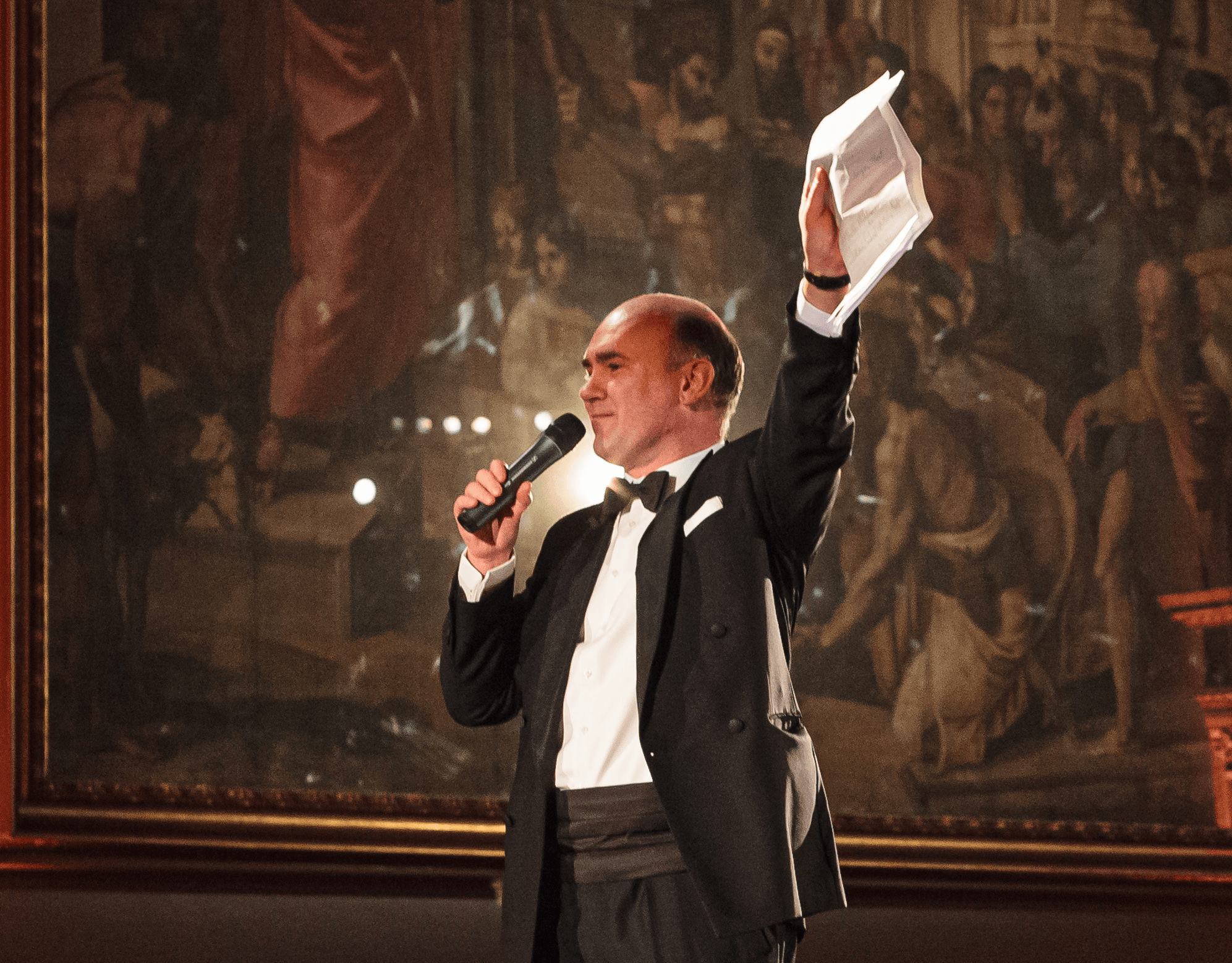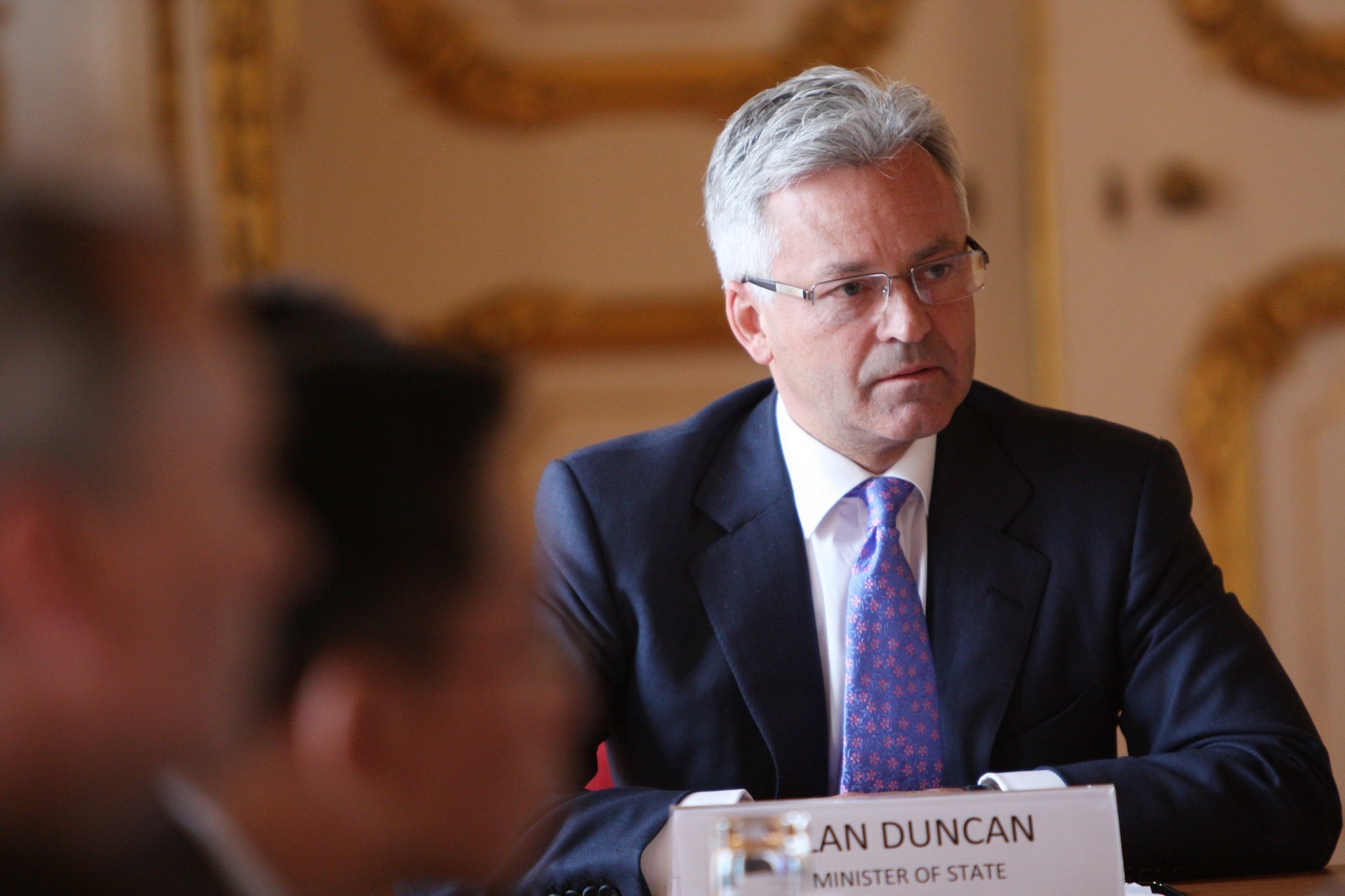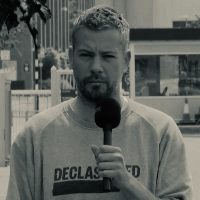- As foreign minister, Duncan lobbied two prime ministers to give Vitol chief executive, Ian Taylor, a knighthood
- Duncan told Whitehall committee approving his new role that he “did not meet with Vitol”, despite at least five social meetings with Taylor while he was minister
- But Duncan tells Declassified “nothing related to professional or political matters was discussed” with Taylor
- Four months after leaving office, Duncan told UK’s top civil servant he had “lined up” role at Vitol
- Duncan also reveals to Declassified that he met Taylor while a minister in 2011 to discuss Libyan oil after Taylor flew to Benghazi to do $1-billion oil deal with rebel fighters
A former UK foreign minister has been approved to take a paid position at the world’s largest oil trader, despite having numerous social meetings with the firm’s chief executive while he was in post.
Sir Alan Duncan even lobbied two prime ministers to give the firm’s chief executive, Ian Taylor, a knighthood while he was a minister.
Duncan was given approval in May to take up the role of director of business development at Dutch company Vitol by the Advisory Committee on Business Appointments (Acoba).
This Whitehall body considers applications for private sector employment from former ministers and senior civil servants within two years of their leaving public service.
It is chaired by Lord Eric Pickles, a Conservative life peer who Duncan refers to as “Fat lump Pickles” in his recently published diaries and subsequently by the acronym FLP.
Vitol made $3-billion in profits last year, but Duncan’s remuneration in his new role, which he has written was “lined up” within four months of leaving office, is not known.
Duncan’s job at the company involves “the development of business strategy and oversight of investment performance, principally in Pakistan”, but he “may be asked to cover additional countries/regions”.
The former minister told Acoba that during his time in office he “did not meet with Vitol” and that “there was no relationship” between his department and the company.
But Duncan’s newly released diaries, In The Thick of It, reveal that while he was a minister he had five social meetings with Ian Taylor, Vitol’s then chief executive. Duncan also reveals he lobbied two prime ministers to secure a knighthood for Taylor, who died in June 2020. Duncan and Taylor had been friends for nearly 40 years.
The new information, which has been publicly available from April but did not feature in Acoba’s approval letter in May, raises further questions about the government approving appointments without sufficiently investigating potential conflicts of interest.
Earlier this year, Declassified revealed that dozens of former senior UK officials are profiting from fossil fuel corporations after they leave office, in appointments rubber-stamped by Acoba.
Acoba’s rules purport to be designed to “counter suspicions that decisions and statements of a serving Minister might be influenced by the hope or expectation of future employment with a particular firm or organisation”.
They further seek to ensure the employer cannot make “improper use of official information to which a former Minister has had access”.
Duncan was told by Acoba he could not draw on privileged information available to him from his time as a minister or lobby the UK government on behalf of Vitol for two years after leaving office. As the role was approved in May this year, 22 months after he stepped down as minister, this means that Duncan can lobby the UK government for Vitol almost immediately.

Lobbying
Duncan was announced as Minister for Europe and the Americas on 19 July 2016. Just over a week later, Taylor called Duncan to “seek [his] advice” after learning that the Cabinet Office’s Honours Committee was trying to block him from receiving a knighthood in David Cameron’s resignation honours.
Critical media reports about Vitol’s dealings with repressive regimes had appeared in the British media. “It is intolerable that civil servants, who know all too little about business, can make judgements based on a Google search which would deprive someone like Ian of the recognition he so deserves”, Duncan wrote.
Duncan decided to take action. The following day, he spoke to Laurence Mann, who ran the office of then prime minister David Cameron. “Explain the Ian [Taylor] situation and say I hope [David Cameron] will put his foot down and simply insist”, he wrote.
The next day, Duncan went further: “Get through to Michael Spicer, who as Lord Spicer now chairs the Political Honours Sub-Committee, to ask what the hell is going on. He says there is a limit to what he can do if a nomination has been obstructed before it reaches him.”
Duncan then emailed Taylor to tell him “he might be wise to withdraw from the honours recommendations and save it for later.” Blocking Taylor’s knighthood marked “a despicable day for the decency of British politics”, according to Duncan.
Taylor then issued a statement he had “discussed” with Duncan, which said he would rather not be considered for an honour at all. Duncan wrote: “It runs as the main ribbon on Sky at 10pm, within twenty minutes of him announcing it. It’s so unjust, but he has emerged from the episode with his dignity intact.”
However, Duncan did not let the matter rest and brought up the issue again in March 2018 during a one-on-one meeting with new prime minister Theresa May.
“I mentioned that Ian [Taylor] has cancer and she should give him a [Knighthood]. Her deadpan reaction was not that she doesn’t want it to happen, it’s just that she is not prepared to push for something the way Cameron used to. She will never stick her neck out.”
Duncan told Declassified: “No such lobbying was ever made at his [Taylor’s] request. The nomination [for the knighthood] itself was made by others. The conversations were unknown to him and never discussed with him.”
As well as this lobbying, Duncan and the Vitol chief had multiple social meetings while Duncan was foreign minister during 2016-19. Duncan notes in his diary that in January 2017 he attended Taylor’s New Year party and saw Taylor again in Wimbledon, south London, two months later.
That summer, Duncan had dinner with Taylor in Majorca while both were on holiday on the island. The next day they had lunch at the “amazing fortress house which was used as the film set for The Night Manager.”
In January 2018, Duncan even left a reception for France’s President Macron at the Victoria & Albert Museum in London “as he arrived” in order to attend Taylor’s New Year drinks again.
When asked about these meetings, Duncan told Declassified: “I confirm that nothing related to professional or political matters was discussed. Unfortunately, he [Taylor] was seriously ill by then, and the meetings were entirely personal.”
Then in November 2019, four months after leaving his ministerial post, Duncan informed Mark Sedwill, the UK’s highest-ranked civil servant, that “it looked like I had lined up a job with Vitol” and that he had started the process of getting it approved by the government. Taylor was at that point chairman of the company.
Ian Taylor had long been a large donor to the Conservative Party, giving £600,000 in 2015 alone. Meanwhile, Duncan, as shadow leader of the House of Commons, personally received a donation from Taylor to “support” his office in 2008.
Declassified contacted Acoba with the new revelations from Duncan’s diaries. Catriona Marshall, head of Acoba, told us: “You will see from our published letter regarding this appointment that some of the points you raise are covered there”.
She added: “However, not all of the points you raise relate to the consideration that the Committee is required to make under the government’s Rules.”
‘Secret UK cell’
Sir Alan Duncan had worked in the oil industry in the 1980s before entering politics, meeting Taylor while they both worked for Shell. Duncan later worked for Marc Rich, whose company later became the giant multinational Glencore, before forming his own consultancy to advise foreign governments on oil supplies.
He was elected a Conservative MP in 1992 and his first role in government came when he served as international development minister from 2010-14.
Government records show that while he was development minister, in May 2011, Duncan met with Vitol and a “cross Whitehall Libya oil cell” to “discuss Libya” where the UK was then fighting a war to remove the country’s leader.
The UK strategy in Libya involved arms supplies and covert support to militant rebels in the country.
In his diaries, Duncan noted: “Cameron avidly supported the toppling of President Muammar Gaddafi in 2011, and I ran a secret UK cell to block Libya’s oil flow.” Duncan described the cell as aiming to “stop the baddies selling oil while allowing the opposition to do so”.
Duncan told Declassified: “To the best of my recollection (this was ten years ago) he [Taylor] attended one meeting at which I was also present. It was set up at the request of officials so Ian Taylor could brief the Government about the situation on the ground in Libya.”
Around the time of the meeting, Taylor had flown to rebel-held Benghazi in Libya, to strike an oil deal with forces fighting against the Gaddafi regime, providing them with fuel in return for crude oil exports.
The deal was reportedly initiated by the oil minister of Qatar, which was pouring hundreds of millions of dollars worth of arms to the Libyan opposition forces, with the blessing of David Cameron’s government. “The fuel from Vitol was very important for the military,” Abdeljalil Mayuf, an official at rebel-controlled Arabian Gulf Oil in the city, later said.
The operation was “tacitly approved” by Western governments and Taylor flew into Libya in a private plane which was chaperoned by a Nato drone. The deal he struck was reportedly worth $1-billion.
Duncan told Declassified: “I had nothing to do with that visit. Neither I nor the Government had any involvement in the company’s commercial transactions.”
Andrew Feinstein, who founded Corruption Watch UK, told Declassified: “It is deeply worrying that the British government does not seem to be fully investigating public servants’ links to private companies before approving them to take up employment there.”
Feinstein, who sits on the board of Declassified, added: “The revolving door between government and the private sector is the root of so much corruption, the regulations governing it need to be rigorously and strictly enforced.”


